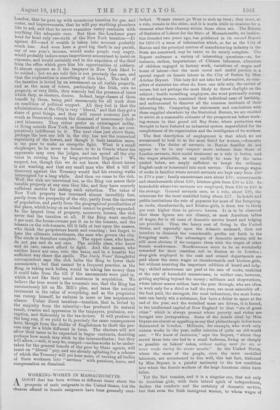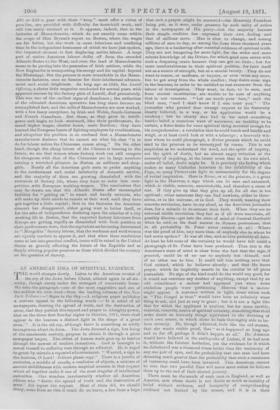WORKING-WOMEN IN MASSACHUSETTS.
AGOOD deal has been written at different times about the prospects of male emigrants in the United States, but the chances offered to female emigrants have been generally over-
looked. Women cannot go West to stub up trees; they must, as a rule, remain in the cities, and it is worth while to examine for a
moment what their chances within those cities are. The Bureau of Statistics of Labour for the State of Massachusetts, an institu- tion founded two years ago, has published in its second Report. for 1870-71 a mass of information which, so far as the City of Boston and the principal centres of manufacturing industry in the- State are concerned, may be taken to be nearly complete. The- Report embraces a variety of interesting questions—as, for instance, strikes, importations of Chinese labourers, education, of children engaged in factory work, variations of wages and hours of labour—but the most novel and useful portion is a
special report on female labour in the City of Boston by Miss Adeline Bryant. This lady did not take her information, as com- pilers of statistics too often do, from one side only, the easiest of access, but not perhaps the most likely to throw daylight on the subject ; beside consulting employers, she went personally among the working-women, examined their individual cases of hardship, and endeavoured to discover all the common incidents of their labouring life. Comparing her statements and conclusions with those supplied elsewhere by the Statistical Bureau, we are enabled to arrive at a reasonable estimate of the prospects set before work- ing-women in that grand old Bay State, where protection was thought to have fostered an industrial system unparalleled for the
completeness of its organization and the intelligence of its workers. The first description of employment is that which we are accustomed to look to as the most fitted for women,—domestio
service. The duties of servants in Boston families do not appear to be in any respect more arduous than those of London servants, their social treatment as a rule is better, and
the wages attainable, as may readily be seen by the rates quoted below, are amply sufficient to tempt the ordinary English cook or housemaid into such service, The average wages- of cooks in families where several servants are kept vary from £90 to £70 a year ; family seamstresses earn about 210 ; nurserymaids- and chambermaids about 230; kitchen-girls from £30 to £20. Itk• households where two servants are employed, from £30 to £40 is' the average. General servants earn, as a rule, about £30, the minimum for the most unskilled being about £17. In hotels and public institutions the rate of payment for most of the foregoing, as cooks, chambermaids, and kitchen-girls, is from ten to thirty per cent. higher than in private houses. It is to be observed that these figures are not illusory, as most American tables of wages, for in all cases of domestic service board and lodging are provided. Thus, the heavy cost of living in the United States, and especially upon the Atlantic seaboard, does not interfere to diminish the considerable profits sot forth in the foregoing scale. The advantages of domestic service will be still more obvious if we compare them with the wages of other female workwomen. Needlowomen seem to be as wretchedly rewarded for their ceaseless toil in Boston as in London ;. shop-girls employed in the cash and errand departments are paid about the same wages as chambermaids and kitchen-girls, but without receiving the important addition of board and lodg- ing ; skilled saleswomen are paid at the rate of cooks, unskilled. at the rate of household seamstresses, in neither case, however, getting anything beyond the money ; milliners and shopworkers, whose labour season seldom lasts the year through, who are often• in work only for a third or half the year, are most miserably off ; the best paid, the strongest, the most industrious, the most fortu- nate can barely win a substance, few have a dollar to spare at the end of the year, and the wretched mass are driven, it is feared, in the intellectual capital of New England to that " sin of great cities " which is always present where poverty and riches are brought into juxtaposition. Some of the details cited by Miss Bryant are almost as appalling as any that philanthropic ladies have disinterred in London. Milliners, for example, who work only sixteen weeks in the year, suffer miseries of quite an old-world sort. " We know of instances," says the Report, "where they crowd three into one bed in a small bedroom, living as cheaply Its possible on bakers' cakes, without tasting meat for six or seven weeks (luring the winter months." In the United States, where the mass of the people, oven the most unskilled labourers, are accustomed to live well, this last fact, italicized by Miss Bryant, is a painful testimony to the low condition into which the female workers of the large American cities have fallen.
Yet the fact remains, and it is a singular one, that not only do American girls, with their inbred spirit of independence, decline the comforts and the certainty of domestic service, but that even the Irish immigrant women, to whom wages of £30 or £40 a year with their " keep " must offer a vision of paradise, are provided with difficulty for household work, and
still less easily retained at it. It appears, indeed, that in the factories of Massachusetts, which do not exactly come within the scope of Miss Bryant's report on Boston, where the wages are far better, but the work is more laborious and confining than in the independent businesses of which we have just spoken, the imported element is fast displacing native labour. A large part of native American labour drifts off from the crowded Atlantic States to the West, and even the land of Massachusetts seems to be passing into the possession of Irish settlers, while the Now Englander is transporting his energy and his capital beyond the Mississippi. But the process is most remarkable in the Massa- chusetts factories, once so famous for their intellectual advance- ment and social brightness. As long ago as 1848, the Lowell Offering, a clever little magazine conducted for several years with apparent success by the factory girls of Lowell, died prematurely. This was one of the earliest signs of decadence ; the extinction of the educated American operative has long since become an accomplished fact, and the mills of Massachusetts are now worked, with a few fancy exceptions, by Irish and Welsh, South-Germans and French Canadians. But these, as they grow in intelli- gence and begin to look westward, like their predecessors, de- mand higher wages, shorter hours, more freedom ; they have learned the European lesson of fighting employers by combinations, and altogether the problem is so confused that a Massachusetts manufacturer declares that he cannot see what his class "is to do for labour unless the Chivatnan comes along." On the other hand, though the cheap labour of the Chinese is looming in the future, we see that women whose factory work can still compete for cheapness with that of the Chinaman are in large numbers earning a wretched pittance in Boston as milliners and shop-
girls. Nearly all the American girls seem to prefer anything to the confinement and social inferiority of domestic service, and the majority of them are growing dissatisfied with the restraints of factory life, where they have to enter into com- petition with European working-women. The conclusions that may be drawn are that the Atlantic States offer unexampled facilities for " gettiug on " to smart and handy servants, who will make up their minds to remain at their work until they have got together a little capital ; that in the factories the American element has disappeared, either going west to better itself, or for the sake of independence declining upon the miseries of a city working life in Boston, that the imported factory labourers from Europe are getting rapidly as dissatisfied with their position as their predecessors were, that the capitalists arebecoming determined to " Mongulize " factory labour, that the workmen and workwomen are equally resolute to oppose it, and that when these resolutions come at last into practical conflict, issues will be raised in the United States as gravely affecting the future of the Republic and as _deeply stirring popular passions as those which divided the country on the question of slavery.































 Previous page
Previous page